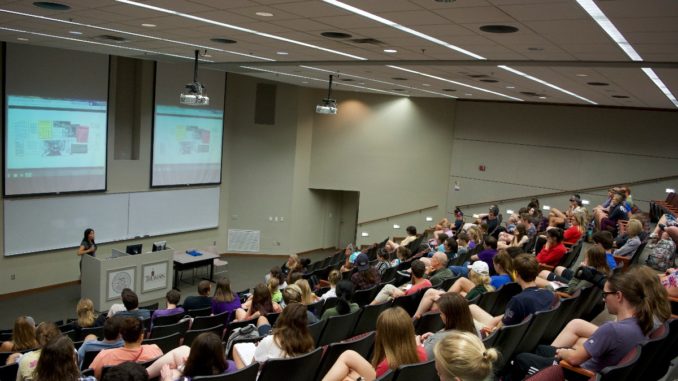
Many Truman State University professors have been forced to change course delivery because of the COVID-19 pandemic, disrupting assignments and expectations as they once were.
Professors have continued the semester with alternative delivery options, such as replacing live lectures and discussion with online discussion boards and video lectures. The intensity of their grading, as well as how and where they work, have also been modified.
Communication professor Craig Hennigan laments that his students are not with him and his favorite activity in his public speaking class had to be canceled altogether.
“My favorite activity in my COMM 170 course — an extra credit activity with food and fun — had to be canceled,” Hennigan said in an email statement. “Even though I possibly could have replicated it online, the amount of work to do it effectively would not have been worthwhile. It was very upsetting.”
Some professors might be worried about how their students are feeling about their coursework, as they now rarely receive feedback from them. Communication professor David Price said that he has not heard from some students since spring break.
“A few [students] have vanished — not done anything in class since spring break,” Price said in an email statement.
Price said those students that have not been heard from have been reported up the academic chain of command.
English professor Jocelyn Cullity said she worries about how her students will be able to keep up with their course load now that they are in a new environment with different responsibilities.
“I worry about how they are set up at home,” Cullity said in an email statement. “Some have no access to Wi-Fi, some have very little access, sharing with siblings, some have parents who have lost jobs and all of them, like Truman [professors], had to switch gears quickly to the online environment.”
Some professors have changed their grading policies or the weight of some assignments because of the changes. Price said he has become more lenient in grading than he might normally be.
Price said he doesn’t think professors should be faulting students as they would in normal circumstances because the pandemic has posed a new and unpredictable situation.
Price said many of his students are without reliable internet connection, have taken on new jobs or family responsibilities or are facing new anxieties, stresses and uncertainties.
“How are professors supposed to have the same expectations and strictly enforce classroom policies and grading when the students are living [among] all that disruption,” Price said. “We can’t. We shouldn’t. We’re all human and compassion is most important in times like this — more important than strict grading and class rules.”
The switch to online classes has been a challenge for many professors, both in the classroom and out. Some are working from home, while some find this to be a little more challenging. Hennigan, for example, said he doesn’t even own a desk at home.
Price, who still uses his office in Barnett Hall, explained he is more isolated in his office than at home.
“Sometimes it feels like there is nobody in Barnett Hall except me. The downside to that, of course, is I most days don’t talk to anyone for hours on end,” Price said.
